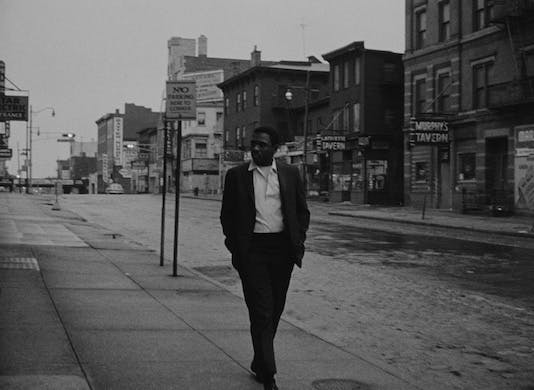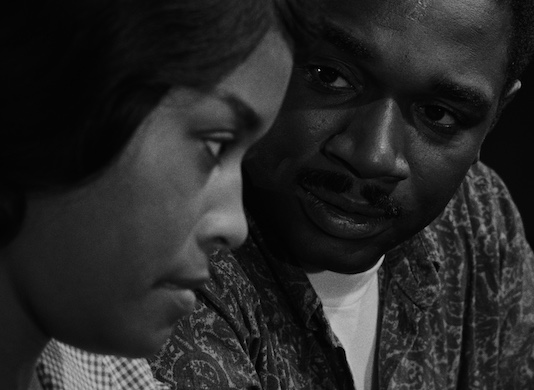With Director Michael Roemer’s Reputation Rising, His ‘Nothing But a Man’ Gets a 4K Restoration
Although the picture has been acknowledged by any number of critics as well as the Library of Congress, ‘Nothing But a Man’ isn’t necessarily a title that rolls off the tongue when discussing cinematic highlights of the 1960s — yet.

A 1964 film by director Michael Roemer, “Nothing But a Man,” is likely best known for the reason that everyone involved with it is better known for other things. The picture’s male lead, Ivan Dixon, spent five seasons as Sergeant James Kinchloe on the television series “Hogan’s Heroes,” later becoming a film and television director. Another performer, Abbey Lincoln, has a claim on history as a civil rights activist and jazz singer.
Then there are Julius Harris, who would star in a number of signature Blaxploitation films, including “Superfly” (1972) and “Hell Up in Harlem” (1973), and Yaphet Kotto, who earned worldwide fame for his role as Parker in the smash hit “Alien” (1979). The men would be reunited as Bond villains in “Live and Let Die” (1973), respectively starring as Tee-Hee and Dr. Kananga. “Nothing But a Man” was the first film credit for both actors.
Mr. Roemer, still with us at age 96, isn’t as high-profile. His reputation has, all the same, gained in recent decades, particularly with the rediscovery of “The Plot Against Harry” (1971). The deadpan comedy about gangsters, redemption, and the tsuris that comes with trying to do right by family met with little notice upon its original release. It has since been hailed, rightfully in my estimation, as an absurdist masterwork.
Recently released as a Blu-Ray by the Criterion Collection in a new 4K restoration, “Nothing But a Man” isn’t absurd in the least, but it is similarly unsung and equally as masterful. Although the picture has been acknowledged by any number of critics as well as the Library of Congress, “Nothing But a Man” isn’t necessarily a film that rolls off the tongue when discussing cinematic highlights of the 1960s.
Given some of the films from that troublesome decade that are touted as milestones — I’m looking at you, “Easy Rider” (1969) — “Nothing But a Man” comes on like a benison. It’s the rare work of art that elaborates on its historical parameters even as it transcends them. As a snapshot of life amongst Black Americans living under trying circumstances and during a time of change, Mr. Roemer’s picture is hard to beat.

The director collaborated on the script with Robert M. Young, who also served as the film’s cinematographer. Having fled Nazi Germany as a child, Mr. Roemer predicated some of his own experience as an oppressed minority into the screenplay. The two men did their legwork, traveling to the American South in what the director dubbed the “Underground Railroad in reverse.” These two Jewish New Yorkers encountered resistance from and threats by members of the white community upon meeting, talking, and staying with African-American families during their travels.
The result of their efforts is a film of stark understatement, of a people coming to terms with shifts in culture that hold promise even as they underline their vulnerability.
Duff Anderson (Dixon) works on a railroad crew alongside a corps of men given to brassy talk, card playing, and a life of itinerant pleasures. Duff is meditative, soft-spoken, and made of stern stuff. He’s tight-lipped but decisive. Dixon assays the role with terse and often pointed authority. He’s riveting in the part.
Forsaking a night at the pool hall with his buddies, Duff wanders through town and finds himself at a church social. It is there that he meets Josie (Lincoln), a decorous woman in her 20s and, alas for non-believer Duff, the preacher’s daughter.
Duff is out for some quick action, but Josie’s benevolence and her fortitude leave a mark. Lincoln, in a measured performance, matches Dixon beat for beat in terms of integrity and nuance. Duff and Josie become that rarest of cinematic properties: a real couple.
Duff and Josie undergo significant travails. There’s the disapproval of Josie’s parents to their nuptials and the nagging absence of Duff’s young son, who he abandoned in Memphis. When Duff quits the railroad and starts working construction, he earns the enmity not only of his white bosses but his black comrades, many of whom are disinclined to challenge the status quo. And then there’s Duff’s father, Will (Harris), an alcoholic who spends what little time he has with his son rebuffing any attempt at reconciliation.
“Nothing But A Man” isn’t an easy movie for a variety of reasons, particularly for what it says about race relations in mid-20th century America. Still, the script doesn’t ennoble the characters at the risk of denuding them of their humanity. The rough edges of Mr. Roemer’s made-on-the-cheap movie endows it with a documentary-like verisimilitude that grounds the mise-en-scène and bolsters the drama that accrues from it.
What we’re left with, in short, is a remarkable achievement, a film of profound insight and welcome charity. Here, in short, is one of the best films of the 1960s and, for that matter, the here-and-now.

